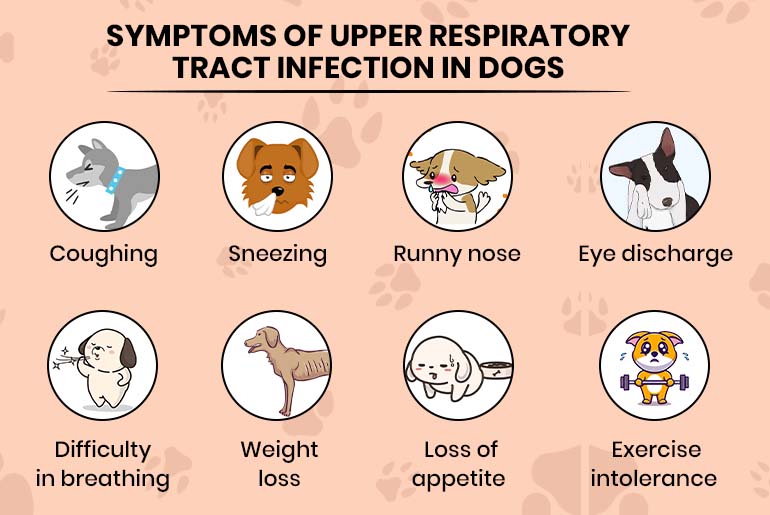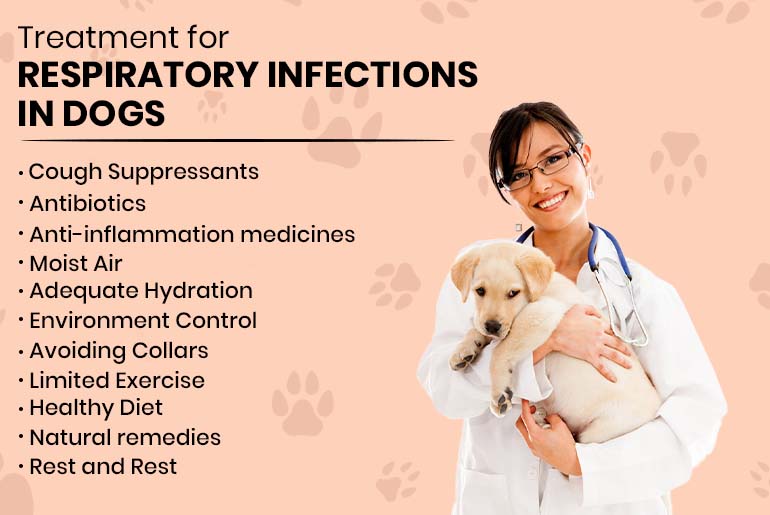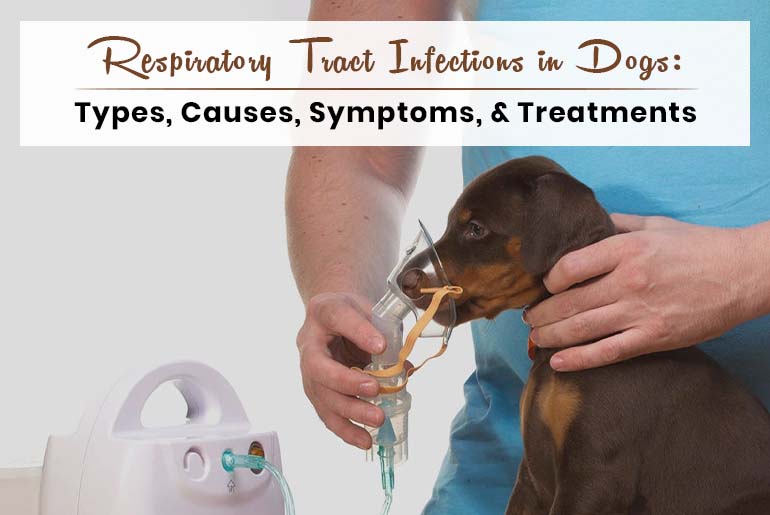[ad_1]
If you notice that your dog is coughing, sneezing, or exhibiting any symptoms that resemble the common cold in humans, chances are that they are suffering from a respiratory tract infection. Upper respiratory tract infections in dogs are often life-threatening too.
Furthermore, there is reportedly an uptick in the incidence of dog respiratory illnesses after the COVID pandemic, and dog parents are worried about what it is all about. Learning more about this common dog ailment will help you identify and treat it before it complicates.
What is an Upper Respiratory Tract Infection in Dogs?
Upper respiratory tract infections affect the nasal cavities, throat, sinuses, and respiratory airways of the dog. These infections are caused by bacteria, fungi, or viruses and are highly contagious. While these infections generally pose no threat to life, they may sometimes result in fatal conditions like pneumonia.
Kennel cough, another common problem in dogs, is extensively mistaken for upper respiratory tract infections. Since there is a notable difference between the two, it is essential to understand both of them.
Difference between Kennel Cough and Upper Respiratory Tract Infections
Kennel cough is one of the most prevalent infectious diseases in dogs. It is caused by a combination of bacteria and viruses, and it affects the trachea and lungs of the dog. Therefore, it mostly impacts the chest areas or lower respiratory tract region, whereas upper respiratory tract infections mostly affect the upper part.
Also known as bronchitis or Canine Infectious Respiratory Disease Complex (CIRDC), this condition is characterized by a harsh cough and a goose honk sound as if something is stuck in the dog’s throat. And, as the name suggests, kennel cough is mostly spread through kennels, shelter homes, and facilities where the dogs are gathered or sheltered.
What exactly is the Current Dog Pneumonia Outbreak?
Since 2021, there has been a notable rise in the cases of canine respiratory diseases in the United States. The veterinarians across the globe are reporting that dogs are becoming resistant to the standard treatment protocols. This respiratory illness outbreak is broadly termed as “canine pneumonia”.
Canine pneumonia isn’t well understood yet, but according to expert veterinarians, affected dogs show symptoms related to CIRDC, and their upper respiratory tract is also affected. They develop symptoms like lethargy, loss of appetite, breathing problems, nasal discharge, and a honking cough.
Overall, it is a more complex respiratory tract infection, and its exact cause is not yet identified. The infection spreads very quickly, so the affected dogs must be taken to the vet as soon as possible.
[Also Read] Tips for A Successful Online Vet Consultation
Causes of Respiratory Infections in Dogs
Dogs that live in groups or kennels, dogs with compromised immune systems, and dogs exposed to infected dogs are more vulnerable to URIs. Dog respiratory infections are caused by bacteria, viruses, and other parasites, and they may have multiple causes too.
Some of the common causes are as follows:
- Bacteria: Bacteria including Bortadella bronchiseptica that causes kennel cough are one of the most common causes of respiratory infections in dogs.
- Virus: Viruses like the Canine Influenza virus, Adeno Type II virus, and Canine Distemper virus contribute to various respiratory illnesses in dogs.
- Parasites: Lungworm infections and canine heartworm disease can affect your dog’s lungs, causing respiratory infections.
[Also Read] Common Heartworm Prevention Mistakes Dog Parents Makes
Symptoms of Upper Respiratory Tract Infection in Dogs
The symptoms of URIs in dogs are very similar to the symptoms of cold and cough in humans. If you notice any of these symptoms, your dog’s respiratory health may be affected.

- Coughing
- Sneezing
- Fatigue
- Runny nose
- Eye discharge
- Sore throat
- Loss of appetite
- Weakness
- Difficulty in breathing
- Weight loss
- Exercise intolerance
Treatment for Respiratory Infections in Dogs
Mild respiratory infections are generally cleared on their own within 15 days. However, if the infection is severe, it is essential to start treatment as soon as possible.
If your dog is diagnosed with an upper respiratory tract infection, your vet will suggest the following:

1. Cough Suppressants
Your vet will recommend cough suppressant medications to prevent the coughing and discomfort related to it.
2. Antibiotics
Most bacterial infections can be treated with antibiotics like amoxicillin, doxycycline, azithromycin, and cephalexin, so your vet will also recommend an antibiotic as per the type or severity of the infection.
3. Anti-inflammation medicines
Respiratory tract illnesses cause inflammation in the trachea which can be controlled using appropriate anti-inflammatory and corticosteroid medicines.
4. Moist Air
Airway moistening therapies can help clear the mucus present in the respiratory tract. This includes breathing steam in the bathroom where a hot shower is running.
5. Adequate Hydration
Keeping your dog hydrated is important to alleviate the symptoms of upper respiratory infections. Offer enough water and wet/gravy dog food to maintain hydration and electrolyte balance.
6. Environment Control
An environment that is polluted with allergens can irritate and inflame the respiratory airways. Ensure your pet’s environment is clean to avoid such conditions.
7. Avoiding Collars
A collar can put pressure on your dog’s throat, inducing coughing and discomfort. Alternatively, you can use a harness to reduce this distress.
8. Limited Exercise
Infected dogs may have difficulties breathing, and therefore, limiting their exercise and playtime is crucial for faster recovery.
9. Healthy Diet
A well-balanced, nutritious meal will help maintain immune health, and it will help fight infection quickly.
10. Natural remedies
Some dog owners prefer to use natural remedies to treat the respiratory cough. The use of eucalyptus oil, peppermint oil, and Manuka honey is a great way to soothe your dog’s cough.
11. Rest and Rest
Make sure your dog has a cozy and comfortable spot to rest. Getting plenty of rest will help your dog recover faster.
Are Dog Respiratory Infections Contagious to Humans?
In most cases, bacterial and viral dog respiratory infections are not contagious to humans. Pathogens that infect dogs are generally host-specific, and therefore they only infect dogs. However, there are a few exceptions, such as kennel cough infection, which can be transmitted to elderly people, children, and individuals with compromised immune systems. To prevent any such exceptional cases, it is always a good idea to practice proper hygiene.
Final Notes
Respiratory tract infections in dogs can be managed and treated with the right care and veterinary guidance. These infections usually take 7–14 days to clear and often simply need to run their course. If you notice any respiratory discomfort, do not hesitate to take them to the veterinarian’s clinic. Give them plenty of love and attention along with the course of treatment prescribed, and your four-legged companion will be healthy and strong again.
The post Respiratory Tract Infections in Dogs: Types, Causes, Symptoms, and Treatments appeared first on CanadaPetCare Blog.
[ad_2]
Source link
